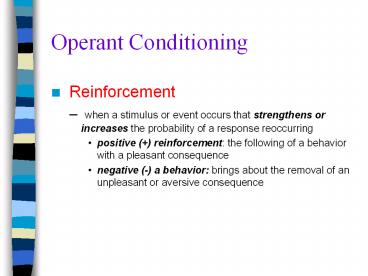Operant Conditioning - PowerPoint PPT Presentation
1 / 7
Title:
Operant Conditioning
Description:
Title: Introduction to Psychology Author: Preferred Customer Last modified by: IIT Created Date: 7/7/1998 3:26:24 PM Document presentation format – PowerPoint PPT presentation
Number of Views:47
Avg rating:3.0/5.0
Title: Operant Conditioning
1
Operant Conditioning
- Reinforcement
- when a stimulus or event occurs that strengthens
or increases the probability of a response
reoccurring - positive () reinforcement the following of a
behavior with a pleasant consequence - negative (-) a behavior brings about the removal
of an unpleasant or aversive consequence
2
Principles of Reinforcement
- Reinforcers
- Primary Reinforcer
- innately reinforcing stimulus
- i.e., satisfies a biological need
- Secondary (Conditioned) Reinforcer
- usually learned
- i.e., praise, rewards, money,
- gains its reinforcing power through its
association with primary reinforcer
3
Principles of Reinforcement
- Continuous Reinforcement
- reinforcing the desired response each time it
occurs - must initially occur for a behavior to be
acquired quickly - Partial (Intermittent) Reinforcement
- reinforcing a response only part of the time
- results in slower acquisition but greater
resistance to extinction - must occur for a behavior to be continued
4
Operant Conditioning
- Punishment
- an aversive event that decreases the behavior
that it follows - positive punishment when a behavior is followed
by an aversive or negative consequence - negative punishment when a behavior is followed
by the removal of a desirable stimulus
5
Operant Conditioning
- Punishers
- Primary Punisher
- usually innate and biological in nature
- i.e., heat, cold, hunger, physical discomfort
- Secondary Punisher
- usually learned
- i.e. criticism, shame, scolding, demerits, etc.
- gains influence when associated with primary
punisher
6
Punishment
- For punishment to be effective
- must be consistent
- should not be done in anger or involve abuse
- should include info about what is expected or
appropriate behavior - should be followed with reinforcement of desired
behavior
7
Operant vs Classical Conditioning

